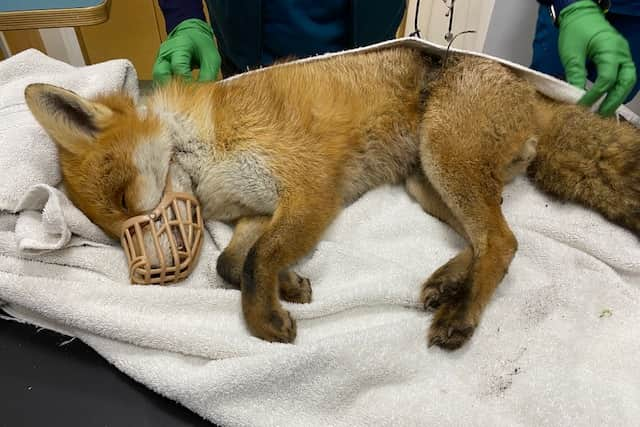Illegal snare: RSPCA issues warning after trap kills fox in York - why it is harmful
and live on Freeview channel 276
The RSPCA has issued a warning about the use of illegal snares after a young male fox was killed in York last month. The animal charity said it has launched an investigation into the incident in which a fox was caught in a self-locking snare and suffered severe body injuries.
On January 18, staff from the charity’s York Animal Home in Landing Lane were alerted about the distressing incident after a member of the public found the critically injured animal in a hedgerow in Rye Walk, near a residential area in York.
Advertisement
Hide AdAdvertisement
Hide AdThe illegal self-locking snare had caught the young fox around his middle and tightened as he struggled to free himself, causing appalling injuries. The wire loop device had been dug into the ground and attached to a stake which had been anchored down.
According to the animal rescuers, the snare had caused such severe injuries that the decision was made by the vet to put the animal to sleep to prevent further suffering. RSPCA deputy chief inspector Claire Mitchell said: “It’s a devastating sight when you see a beautiful, wild animal with horrific injuries like this.
“This was an illegally set self-locking snare which had caused untold suffering to this young mammal. Worryingly, it has been placed in close proximity to residential streets where people may have pets, and our concern is that there may also be other devices set up in this area.”
She added: “We are just very grateful that this fox was spotted and not left to suffer in this awful state for even longer. These cruel and barbaric devices have devastating consequences and I’d urgently appeal to anyone with information about this incident to get in contact with us.”
Advertisement
Hide AdAdvertisement
Hide AdThe RSPCA - which is opposed to the manufacture, sale and use of all snares and any traps which cause suffering - has appealed with anyone with information about the incident to contact them, in confidence, on 0300 123 8018.
Why are illegal snares harmful?
There are regulations governing the use of snares. According to the RSPCA, It is illegal to set these devices for birds, deer, badgers and certain other species, though snares cannot distinguish between animals and may trap the wrong one. It is up to the person setting the snare to ensure that the snare they use complies with the law.


The Wildlife and Countryside Act 1981 prohibits the use of self-locking snares which, as a variation on the traditional noose, tightens as the animal struggles to escape. Under the Act, users of free running snares must take all reasonable precautions to prevent injury to protected animals, but precautions provide no guarantee against such an event.
It is also a legal requirement that snares be checked at least once a day, yet from the severity of the injuries caused to a lot of animals it seems that many people do not follow even this minimal requirement.
What you need to do if you find an injured animal
Advertisement
Hide AdAdvertisement
Hide AdThe RSPCA said you should never try to free an animal from a snare or trap as they are often more seriously injured than you think. If you find an injured wild animal, then stay back to avoid stressing the animal and call the RSPCA’s emergency line on 0300 1234 999.
For more advice on dealing with injured animals, please visit the RSPCA website.
